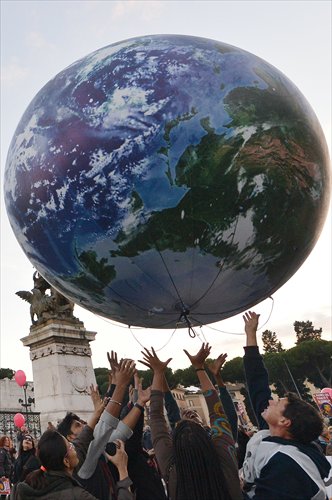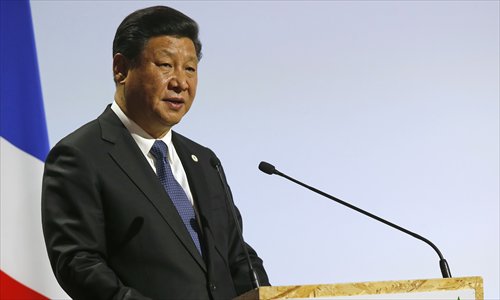Xi pledges emission peak around 2030
Developed nations urged to pay for climate action

People play with a giant balloon representing Earth at Piazza Venezia during a rally calling for action on climate change in Rome on Sunday, a day before the launch of the COP21 conference in Paris. Photo: AFP

Chinese President Xi Jinping addresses world leaders at the UN climate change conference in Le Bourget, outside Paris, on Monday. Photo: AP
Chinese President Xi Jinping on Monday pledged plans to achieve the peaking of CO2 emissions around 2030, urging developed nations to fulfill their commitment to provide funds to developing countries to tackle climate change.
Xi also urged developed countries to accept "more shared responsibilities" to limit global warming and help poor countries adapt to a climate-afflicted world.
"Developed countries should honor their commitment of mobilizing $100 billion each year from 2020 and provide stronger financial support to developing countries afterwards," Xi said at the UN climate conference in Paris, also known as COP21.
"It is also important that climate-friendly technologies be transferred to developing countries," Xi noted.
The highly-anticipated meeting aims to yield a new international agreement to reduce greenhouse gases beyond 2020.
In 2009, developed nations pledged at the Copenhagen climate meeting to muster $100 billion annually in financial support to poor countries starting in 2020. Six years after the pledge, rich nations have failed to fully commit to the fund.
"Developed countries should take responsibility to pay for their historic climate debt. Capable nations, organizations, and individuals should take action since it is difficult for some developed countries to reach agreement on providing the money," Bai Yunwen, policy director of Beijing-based nongovernmental organization Greenovation Hub, told the Global Times on Monday.
Bai said that some traditional and newly established financial organizations could also help to find funds for developing countries to develop clean energy.
Legitimate needs
Xi also called for a rejection of the narrow-minded mentality of a zero-sum game in his speech.
"Addressing climate change should not deny the legitimate needs of developing countries to reduce poverty and improve their people's living standards," Xi said.
"Xi's remarks reflect the principles of common but differentiated responsibilities, equity and respective capabilities," Yang Fuqiang, senior advisor on climate and energy at the Natural Resources Defense Council, told the Global Times.
The Chinese president on Monday also met with US President Barack Obama for talks at the launch of the Paris climate conference, after which the two leaders agreed on responsibility to act on climate change.
Xi stressed that China and the US should advance practical communication and cooperation at bilateral, regional and global levels and in areas including pushing for the achievement of the anticipated goals at COP21.
Obama said the leadership of China and the US has been "absolutely vital" and will lead 180 nations to make their own pledges to curb emissions in the ongoing climate conference.
"We expect an all-round and balanced solution covering actions and mechanisms and it should attach equal importance to emission cutting, adaptation, funding and transfer of technologies," said Yang.
'Hope of humanity'
Some 150 heads of government and state attended the meeting on Monday.
French President Francois Hollande said that "never have the stakes of an international meeting been so high, because we are talking about the future of the planet, the future of life."
"The hope of all of humanity rests on all of your shoulders," he said.
Russian President Vladimir Putin said climate change has become one of the gravest challenges that humanity is facing.
Meanwhile, researchers found that the world's 48 poorest countries will need to find around $1 trillion between 2020 and 2030 to achieve their climate plans.
Estimates based on plans submitted by the least-developed countries toward a new UN deal to curb global warming show they will cost around $93.7 billion a year from 2020, when an agreement expected to be ironed out in Paris over the next two weeks is due to take effect.
The least-developed countries - from Ethiopia to Zambia, and Yemen and Pacific island nations - are home to some of the poorest communities who are suffering the worst impacts of intensifying droughts, floods, storms and crumbling coastlines.
Yet they produce just a tiny fraction of the planet-warming gases that drive climate change.
Agencies contributed to this story